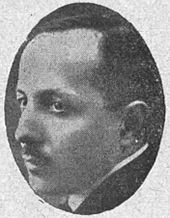Apolinary tempered glass
Maximilian Meir Apolinary Hartglas , also Appolinari Hartglas und other spellings (born April 7, 1883 in Biała Podlaska , Russian Empire ; died March 7, 1953 in Jerusalem ) was a Jewish Polish-Israeli journalist and politician.
Life
Apolinary tempered glass came from an assimilated Jewish family of lawyers in Russian Poland . He attended grammar school in his hometown from 1892 to 1900 and then studied law at the Russian University of Warsaw. He received his doctorate in 1904 with the dissertation The legacy without a will in Poland and Russia .
As a student he joined a Zionist organization and was imprisoned for three weeks in 1903 for political activity. In the following year he was expelled from the bar for political reasons. From 1907 to 1919 he practiced as a lawyer in Siedlce , which was interrupted during the First World War when the Germans conquered Poland and interned him in Germany.
After his return he was a member of the city council of Siedlce and in 1919 was delegated for the Folk Party to the constituent Sejm , where from 1922 he became leader of the Zionist faction with Jitzchak Gruenbaum and Osias Thon in the elected Sejm and was a member of parliament until 1930. Because of the authoritarian and undemocratic nature of Marshal Józef Piłsudski's policies , he did not stand for election in 1930.
In 1919/20 he edited the Zionist magazines Tygodnik Żydowski and Życie Żydowskie (Jewish life), each in Polish. After that he was a regular contributor to the Yiddish newspaper Hayjnt . Hartglas acted as defense lawyer for Jews in some of the criminal proceedings that were perceived by the Polish public. When the first attempts by national democratic politicians in Poland were made in 1922 and 1923 to stir up anti-Semitic sentiments in the population with a numerus clausus for Jews, Hartglas described this as an attack on the human and civil rights of Jews.
Tempered glass was named after the German occupation of Poland by Adam Czerniaków in 1939 for the Warsaw Jewish Council imposed by the Germans . He fled to Trieste in December 1939 and ended up in Palestine in 1940 , where he found employment with the Jewish Agency . After the establishment of the State of Israel , he became a senior official in the Israeli Ministry of the Interior, which was headed by Gruenbaum, who emigrated in 1933.
Fonts (selection)
- Terytorium a naród (1906)
- Zasady naszego programu politycznego w Polsce (1918)
- Sejm-redes (1923) [Yiddish]
- Poznaj ten kraj: "Do żołnierza polskiego" (1944)
- Na pograniczu dwóch światów . Autobiography. 1996 (posthumous)
literature
- Jolanta Żyndul (Ed.): Pozostawił w rękopisie opublikowany pośmiertnie pamiętnik Na pograniczu dwóch światów . Warsaw 1996.
- Tempered glass, Maximilian Meir Apolinary . In: Encyclopaedia Judaica , Volume 7, 1971, Col. 1361.
- Salomon Wininger : Great Jewish National Biography . Kraus Reprint, Nendeln 1979, ISBN 3-262-01204-1 (reprint of the Czernowitz edition 1925), Volume 3, pp. 6-7.
- Katrin Steffen: Jewish polity? Ethnicity and nation as reflected in the Polish-speaking Jewish press 1918–1939 . Vandenhoeck & Ruprecht, Göttingen 2004. Zugl .: Berlin, Freie Univ., Diss., 2002.
- Ezra Mendelsohn : The Jews of East Central Europe between the world wars . Indiana University Press, Bloomington 1984.
Web links
- Literature by and about Apolinary hard glass in the catalog of the German National Library
- Literature by and about Apolinary Tempered Glass in the WorldCat bibliographic database
- Rafał Żebrowski: Hard glass (s) (Maksymilian) Apolinary , at Żydowski Instytut Historyczny (pl) (Jewish Historical Institute JHI)
- Jolanta Żyndul: tempered glass, Apolinary , at Yivo
- Tempered glass Maksymilian Apolinary (1883-1953) , at Sejm
Individual evidence
- ↑ a b c d e f Great Jewish National Biography , 1925, Volume 3, p. 6f
- ↑ Hard glass, Apolinary at JHI
- ↑ a b c d e hard glass, Apolinary , at Yivo
- ↑ According to the Lemma Apolinary Hartglas in the Encyclopaedia Judaica , tempered glass was a soldier in the Russian army during the First World War and also a soldier in the Polish army during the Polish-Soviet War in 1920.
- ↑ a b c d Encyclopaedia Judaica , Volume 7, 1971, Col. 1361
- ^ Nasz Przegląd , March 30, 1923, quoted in Katrin Steffen: Jüdische Polonität? , 2004, p. 249
- ^ Apolinary tempered glass , at Ghetto Fighters House Archives
| personal data | |
|---|---|
| SURNAME | Tempered glass, apolinary |
| ALTERNATIVE NAMES | Tempered glass, Maximilian Meir Apolinary (full name) |
| BRIEF DESCRIPTION | Polish-Israeli journalist and politician, member of the Sejm |
| DATE OF BIRTH | April 7, 1883 |
| PLACE OF BIRTH | Biała Podlaska |
| DATE OF DEATH | March 7, 1953 |
| Place of death | Jerusalem |
